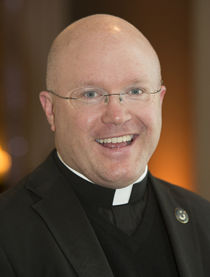
Faith
. . . The standard Jesus calls us to apply is not the way others treat us, or even the way we would want them to treat us, but the way we hope God himself will treat us.

Landry
At the beginning of the Lenten season, at daily Mass, the Church has a heavy focus on Jesus' words from the Sermon on the Mount. That's not particularly surprising, insofar as Lent is intended to foster a thorough spiritual reset, and Jesus in the Sermon on the Mount gives us the Magna Carta of Christian behavior.
On Ash Wednesday, for example, we focus on Jesus' words about prayer, fasting, and almsgiving, and over the next week and a half, he teaches us the Our Father, urges us to have confidence in prayer, and calls us to live by the Golden Rule.
The major emphasis, however, is on what Jesus describes as the particular Christian way of life. He tells us that he wants our "righteousness" to surpass that of the Scribes and Pharisees (who fasted twice a week, prayed three times a day, and tithed everything they owned) and expects our holiness to exceed that of the virtuous pagans (who treated their family members well and loved those who loved them).
What he delineates about the Christian way of life is important not just to live a good Lent, but is especially relevant to the time in which we're living, when so many Christians -- including fervent, practicing Catholics -- have succumbed to the temptation to lower their standards with regard to some of the fundamental orientations with which Christians are supposed to treat others, including and especially those with whom they disagree.
We're living in an age when political and social life have become rancorous. Insults and "ad hominem" attacks are rife. Cancel culture celebrates character assassination by frenzied mobs, often regardless of the veracity or gravity of accusations. Various tabloids, websites and television programs peddle nothing but gossip. Twitter and other forms of social media ooze with hatred and misanthropy, from non-stop political cyberbullying to caustic criticism by vituperative virtual vultures.
It's hard in such a mordant culture not to descend into the gutters. The stakes are high. Those pushing radical agendas often don't even feign civility. If they're driving bulldozers on what seems to be a narcotized rampage, many Christians feel justified, even called, to commandeer tanks to beat them at their own infernal game.
But this is not Christ's way.
Let's listen anew to what Jesus says in these first days of Lent.
"You have heard that it was said to your ancestors," he tells us, "'You shall not kill, and whoever kills will be liable to judgment.' But I say to you, whoever is angry with his brother will be liable to judgment, and whoever says to his brother 'Raqa' ['empty-headed' or 'airhead'] will be answerable to the Sanhedrin, and whoever says, 'You fool,' will be liable to fiery Gehenna."
Jesus is stating quite clearly that he considers insulting others to be like murder. We know that homicidal thoughts routinely begin in contempt for others and Jesus is trying to address murderous deeds at their root. And he says that those who judge others or who call them idiots or morons are liable, like assassins, to hell.
Over the past several months, I've heard many people call President Trump and Sen. McConnell, President Biden and Speaker Pelosi -- not to mention the pope, bishops, celebrities, athletes, and even total strangers on social media -- far worse things than fools. Worse, they often seem proud of it. Do those who speak this way recognize the eschatological consequences of such mental and verbal bile?
The apostle St. John wrote to the early Christians, "Anyone who hates his brother is a murderer," and added, "Anyone who says, 'I love God,' yet hates his brother, is a liar. For anyone who does not love his brother whom he has seen cannot love God whom he has not seen." Dorothy Day had a harrowing saying based on these words: that we love the Lord to the extent that we love the person we like the least. Often, in the least of Jesus' brethren, we treat him about as well as the Roman soldiers did on Good Friday.
Jesus is calling us to a much different standard.
"You have heard that it was said," he tells us the following day, "'You shall love your neighbor and hate your enemy. But I say to you, love your enemies, and pray for those who persecute you, that you may be children of your heavenly Father, for he makes his sun rise on the bad and the good and causes rain to fall on the just and the unjust. ... Be perfect, just as your heavenly Father is perfect."
The rabbis in Jesus' day spent a lot of time distinguishing between "neighbor" and "enemy." Jews, they said, were called to love their neighbor as they loved themselves, but despise their enemy, whom most rabbis said referred to everyone who was not a Jew or at least a God-fearing Gentile.
Jesus, however, calls us to live as chips off the old divine block, to treat even those who have made themselves our adversaries and persecutors the way the father in the Parable of the Prodigal Son regarded the child who dealt with him as if we were dead and asked for his inheritance immediately because he couldn't wait for his dad to die.
God the Father loves both the good and the bad. He wants us to pray for both, and to treat each with unconquerable benevolence. He wants us to love Republicans and Democrats, conservatives and liberals, pro-lifers and abortionists, marriage defenders and dismantlers, even the most radical Qanon and BLM subversives. To love them infinitely more than we passionately may oppose their erroneous ideas or immoral actions.
To state this is not to pretend it's easy. It's excruciatingly hard. But the one who calls us to this standard died for the good and the bad -- and, morally, all of us were in the latter category. With a gloriously scarred hand, he calls us to follow him on this path. And he wouldn't be doing so unless he were prepared to give us all the help he knows we need to live up to it.
The next liturgical weekday Jesus brings these teachings to a conclusion, when, in a passage from the Sermon on the Plain -- the echo in St. Luke's Gospel of the Sermon on the Mount in St. Matthew's -- he brings us back to the Father who wants to help us to treat others as true brothers and sisters: to become Abels not Cains.
"Be merciful, just as your Father is merciful," he says. "Stop judging and you will not be judged. Stop condemning and you will not be condemned. Forgive and you will be forgiven. ... For the measure with which you measure will in return be measured out to you."
Jesus contrasts judging and condemning with mercy. He's not telling us we cannot judge the moral quality of particular acts -- he obviously does, in telling us not to murder or to insult people as fools -- but he clearly is instructing us to beg for God's mercy for them rather than treat them as beyond it. And he makes clear one of the clarion points of the Gospel: that the standard by which we judge others will be the standard by which God judges us.
He tells us, for example, after teaching us the Our Father, "For if you do not forgive others their sins, neither will the heavenly Father forgive you yours." And after the Parable of the Two Debtors, he adds, with reference to the condemnation of the servant who had been forgiven 165,274 years' worth of work (10,000 talents) and yet refused to forgive another 100 days wages (100 denarii), "So will my heavenly Father do to you unless each of you forgives his brother from his heart."
So, the standard Jesus calls us to apply is not the way others treat us, or even the way we would want them to treat us, but the way we hope God himself will treat us.
The devil's great temptation is to get us to think Jesus' way is unrealistic, untrustworthy, and a path for "losers."
Lent is a time in which, together with Jesus, we go out into desert, away from diabolically-induced loathing and lies, so that we, repentant and faithful, might return with Jesus to behave like Jesus -- even and especially when others do not.
- Father Roger J. Landry is a priest of the Diocese of Fall River, Massachusetts, who works for the Holy See's Permanent Observer Mission to the United Nations.
Recent articles in the Faith & Family section
-
Wounds, not scarsJaymie Stuart Wolfe
-
A special collection in the liturgy libraryFather Robert M. O'Grady
-
Witness to a Transfiguration in KenyaMichele Miers
-
Understanding the ScripturesScott Hahn
-
'Cabrini' does extraordinary job of bringing saint to lifeBishop Nicholas DiMarzio


















